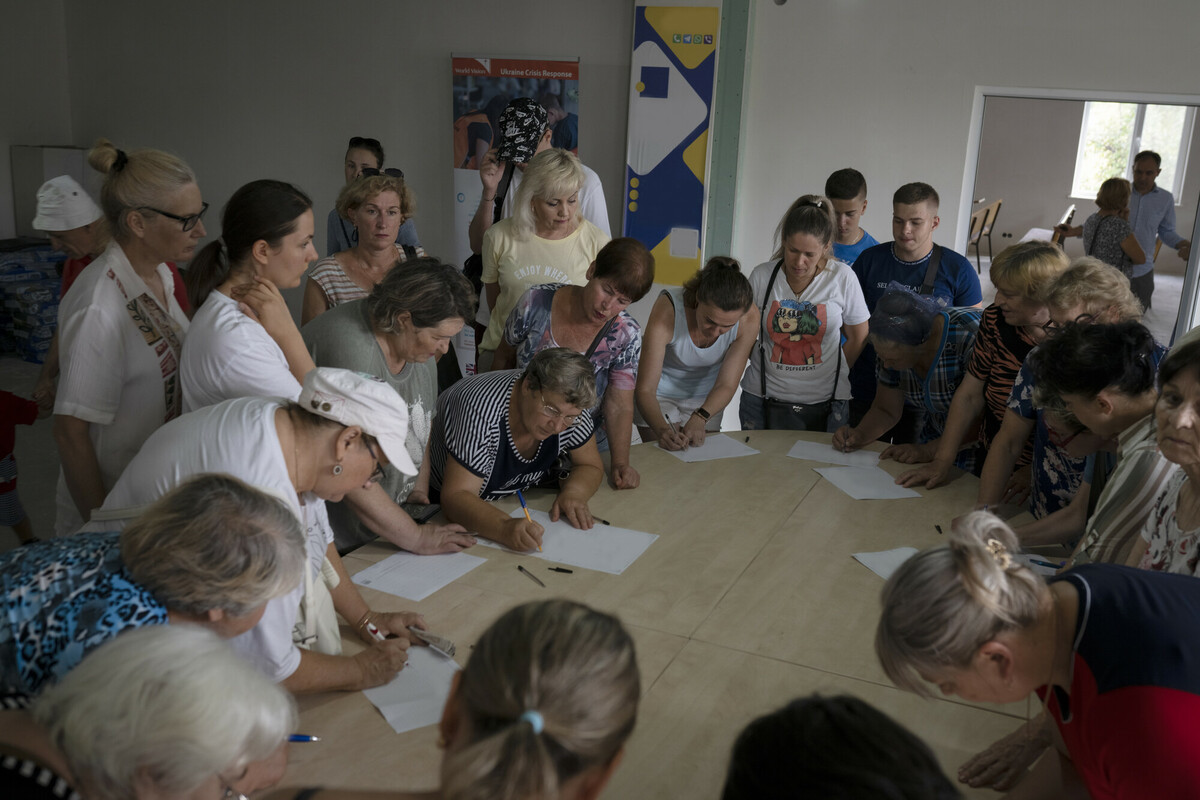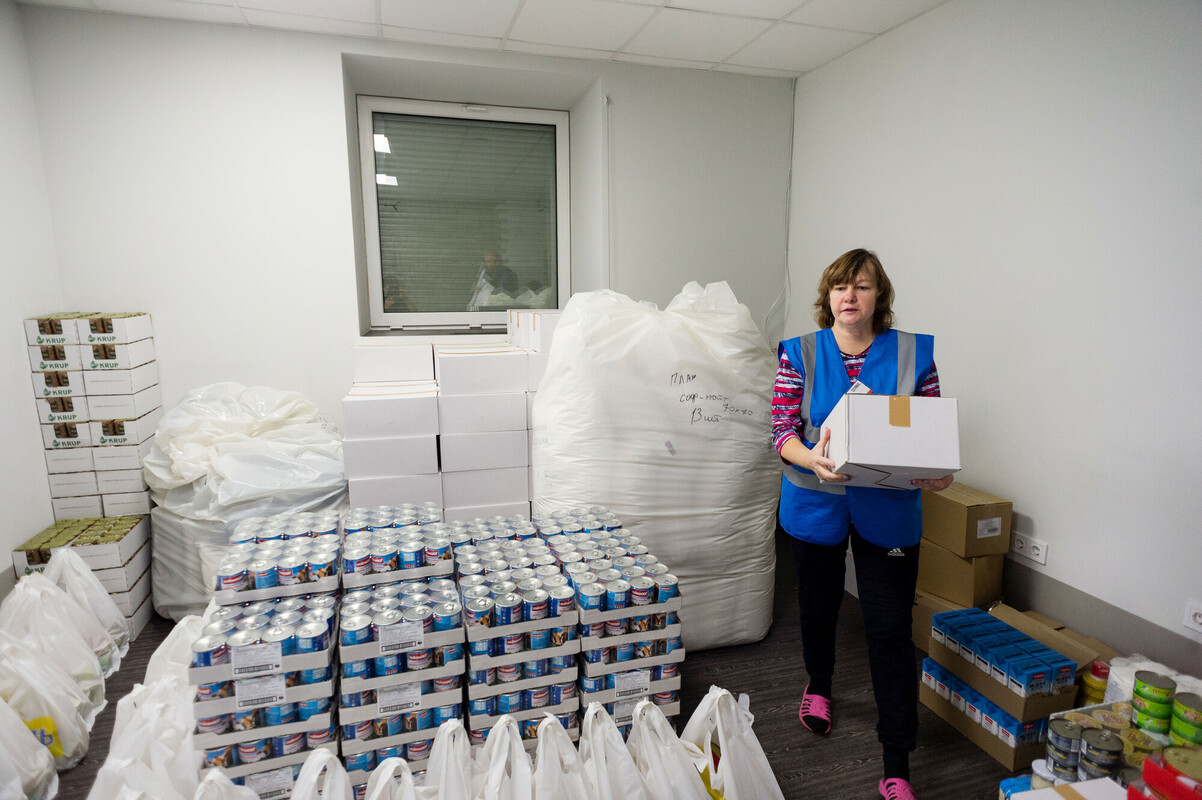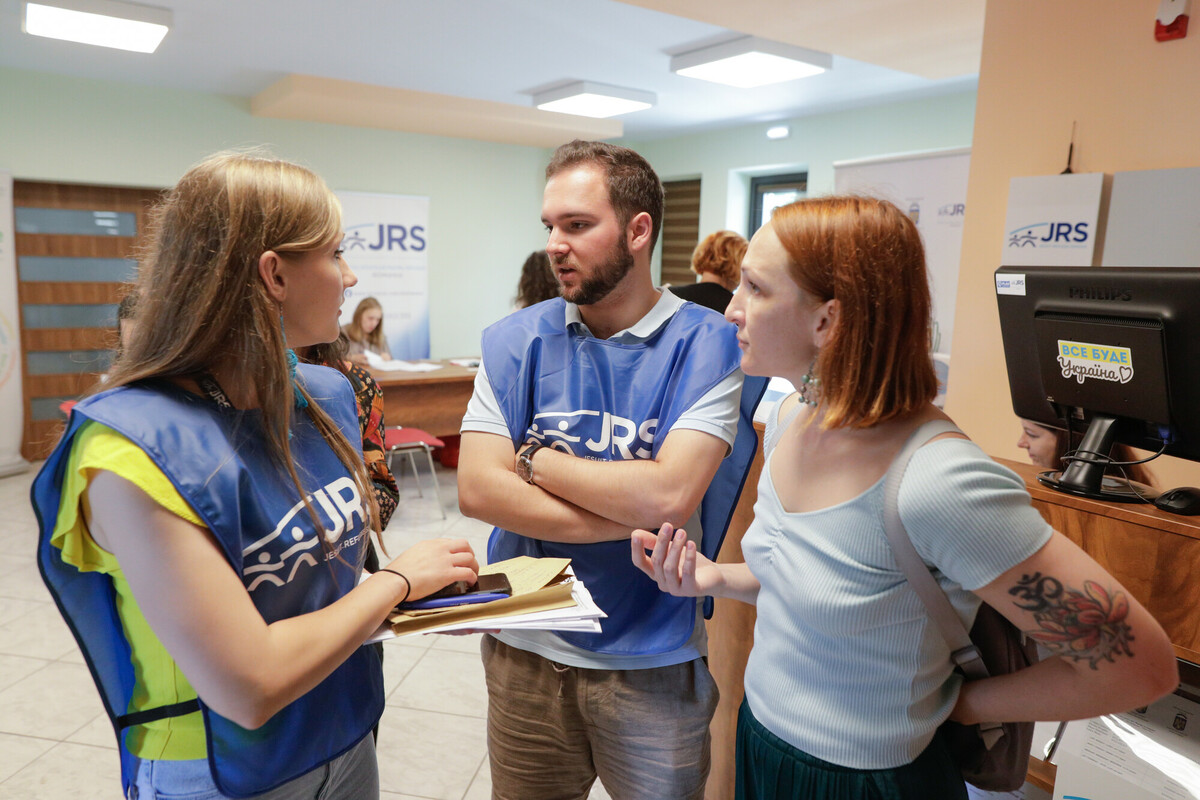When the conflict forced Danylo* to close his business in eastern Ukraine, he decided to turn it into a soup kitchen. Soon the business was feeding 70 people a day with hot meals, but knew they could do more.
Using appeal funds provided through DEC charity Action Against Hunger, they scaled up their operation to feed thousands of people every day, with volunteers peeling vegetables, cooking in huge vats, pot washing and packing meals for delivery. Action Against Hunger provided nutrition advice to help the start-up soup kitchen buy the most suitable ingredients. “We have never been in the restaurant business, but we try to cook delicious food for them,” said Danylo.
“We can say that we feel like giants with our funding from Action Against Hunger,” said Danylo proudly, as behind him people collected cooked meals from a table laden with food in July.
At each stage of the Ukraine crisis, DEC charities and their local partners have helped people face the huge challenges the conflict has thrown up, providing basic, life-saving essentials – food, medicine, water, accommodation. Crucially, too, DEC and its member charities have worked in ways that have meant appeal funds have created an even greater, and lasting, impact.
Aid workers often describe the ‘multiplier effect’ that DEC funding has had on their work by enabling and empowering local people and organisations to help others: from boosting organisations like the Kharkiv kitchen to providing training to organisations working on a humanitarian response for the first time.
Catherine Green, Ukraine Country Response Director for DEC charity World Vision cites a collective centre in Chernivtsi as a case in point. One of the residents, Anna, worked with World Vision’s partner to buy the items they needed to make it habitable.
“That was a place that had no cooking facilities, no bedding, no washing facilities before. So, if the DEC funding hadn't been invested there, those people would have needed to find a different place to live because it simply wasn't suitable,” says Green. With the equipment supplied, Anna was able to start cooking for 150 people.
“Because people were safe in these collective centres, we could then also provide some mental health and psychosocial support,” says Green, “and make sure the children staying there longer term had access to child-friendly spaces, play equipment, trained mental health and psychosocial support workers and other services in the community. What may seem like a small investment has a multiplier effect.”

Many DEC charities have been working through networks of local partner organisations, allowing local groups to take the lead and use their knowledge and contacts to gain maximum benefit for aid recipients. This approach has strengthened and expanded the capacity of these grassroots organisations, developing their skills in a virtuous circle and enabling them to work even more effectively.
In some cases, the funding cascaded down through partners to even smaller organisations. “We chose to rely on the network of NGOs working on the spot,” says Simion Bogdan from SERA, a local partner of CARE International working in Romania. “Some NGOs were experts in child protection, some in gender-based violence etc, so we combined all this expertise to get a full response across every checkpoint... We had about seven or eight NGOs whose interventions were completely financed by the DEC.”
The flexibility of the DEC’s funding is another aspect frequently praised by aid workers. With many humanitarian donors, once a project is agreed it can be difficult for the organisations on the ground to change its scope or location if the needs change. But because the DEC is a relatively small, nimble organisation that works hand-in-hand with its member charities, it takes a highly flexible approach. Although it oversees how funds are spent and makes sure charities aren’t duplicating work, there is a quick process for adapting programmes that are no longer relevant.
“The DEC funding is flexible so if after three months, you realise OK, what you've planned three months ago doesn't work properly anymore for the people you want to support you can change it,” says Lisa Scharinger Oxfam’s Interim Country Lead for Poland. “Of course, you provide justifications but they're also accepted and not, as with some other donors, questioned, because there's also a certain level of trust between DEC member charities and the DEC to make those changes.”
On a large scale, this flexibility was key in responding to the Ukraine crisis, with rapidly changing frontlines and sudden movements of people. But even on a smaller scale it can make funding much more effective and allow charities to take on board feedback from the people they’re helping.

In early May, Orla Murphy, regional response lead for HelpAge, covering Ukraine, Poland and Moldova, visited a collective accommodation centre for displaced people in the east of Ukraine that was to receive funding from DEC charity Age International. As she sat down and spoke to older people, she realised that the hygiene kits they had planned to supply were in fact not the most pressing need.
“They said: ‘We've just got an electricity bill, and we don't know how to pay it,’” says Murphy. Each centre had different needs, so Murphy realised that cash grants – enabling each to choose what to buy – would be a far better approach. Murphy immediately wrote to the DEC proposing changes to the programme.
“Within 24 hours, DEC came back and said: ‘Yes, you can take this forward,’” Murphy says, allowing the release of the cash grants. “If they needed to buy beds, because they didn't have enough, they could do that; or food, or medical support. It also allowed the management in each of these centres to have discussions with the people living there, what did they see as the priority. That engagement was really important. Cash allows people to make decisions.”
“We realised how fabulously flexible the DEC is,” she adds. “This allows us to respond to the changing context, and emerging needs.”
DEC funding also helped provide seed-funding for charities that went on to secure other international donors to further expand their operations.
“At very beginning [our work] was 100% DEC funded – in the first two months because DEC was actually very fast to provide an agreement with us,” says Daniele Pedretti, Humanitarian Manager for HelpAge Moldova, partner of DEC charity Age International. “Without that we could not have provided a single meal. Thanks to the cooperation we had in DEC, we approached the World Food Programme, a UN agency. We already had an established cooperation with the centres and providers. We found another source and we expanded our work because of the experience we had with DEC.”
DEC funding and its flexibility also helped drive innovation in how aid was delivered. In Romania, DEC funds underpinned the setting up of an innovative ‘social store’ concept in the capital Bucharest, replacing food distributions. The project saw participating NGOs pool their resources in one large building to give refugees a simple way to access a much wider spectrum of consolidated support.
Refugees can choose items based on their individual needs rather than receiving standardised aid packages. As well as food support, the store offers household items, psychosocial support, educational services for children, child-friendly spaces, working mothers’ groups and other support groups.
“And this was all available in the same space,” says Eka Zhvania, Country Response Director for Romania & Moldova for World Vision who have distributed over 50 tonnes of food and non-food items through the social store, as well as running its child-friendly space. “This holistic approach was definitely contributing to a change in their daily lives.”
The KOMPASS model developed by eLiberare in Romania is another example of innovation. KOMPASS is designed to help people navigate the bureaucratic system around protection and allow them to access the different services open to them. eLiberare aims to scale it up regionally within Europe, not just for refugees from Ukraine but also for Romanians. There has been interest from further afield too.
“We're creating the basis of something really solid,” says eLiberare President Ioana Bauer. “There are organisations from Africa and Colombia who contacted us to see what the KOMPASS model is and if they can implement it in their own countries.” Find out more about how DEC charities protecting at-risk people in Vulnerable Groups.

The scale of the funding the DEC has been able to provide – thanks to the generosity of the UK public – and the range of organisations it has reached has also led to greater cooperation and knowledge-sharing.
“It’s the reach that the DEC has that is unparalleled,” says Giuliano Stochino-Weiss, of DEC charity Christian Aid’s local partner HEKS/EPER in Dnipro. “As a result, the agencies are talking to each other as they all have DEC funding. It's a loose cooperation that comes from the fact that we all have the same funding.
“The level of sharing of know-how... both at an institutional level, but even people that I meet here on the ground, it's been higher, due to the fact that it's not a competitive response.”
DEC charities and their partners have provided training for staff at other organisations and in some cases seconded their own staff to support them. For example, the International Committee of the Red Cross, which receives DEC funding through the British Red Cross, has provided specialist water engineers to 10 local public water utility companies in Ukraine, along with tools and materials to help repair infrastructure damaged in the conflict.
Bianca Albu, from the Jesuit Refugee Service in Romania, a partner of CAFOD , says they have also seen the added value of working together. “It's an ongoing process of learning every day for us,” she says. “We are also very grateful for our collaboration with CAFOD and the DEC. Because even in this process, we learn a lot. We spend… but we also look into the quality of what we are doing.”
While delivering aid to people in need has been at the heart of the DEC’s response to the crisis in Ukraine, the multiplier effect of the scale of the funding and approach in delivering it will have an impact far beyond the headline figures of people reached. And by funding and strengthening the capacity of local organisations, the legacy of the Ukraine Humanitarian Appeal will reach far into the future.